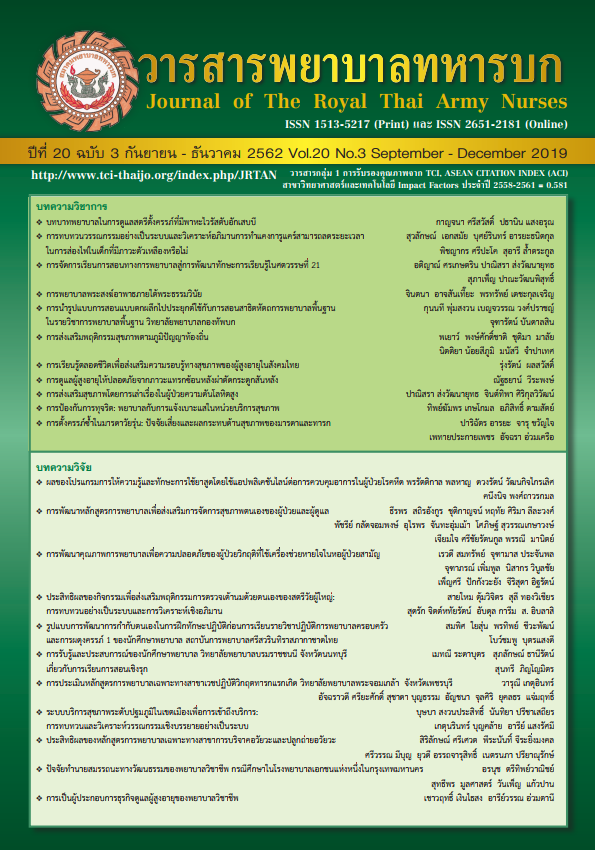Effect of Team-Based Learning on Learning Outcomes According to Thai Qualifications Framework for Higher Education for Nursing Students in The Topic of Therapeutic Relationship
Keywords:
Team-based learning, Learning outcomes, Thai Qualifications Framework for Higher Education, Therapeutic relationship, Nursing studentsAbstract
This research is quasi-experimental research, one group pretest-posttest design to study the effect of Team-based learning method on nursing students’ learning outcomes according to Thai Qualifications Framework for Higher Education for nursing students in the topic of therapeutic relationship. The participants consisted of 64 students who were 2nd year nursing students in Faculty of Nursing, Ubon Ratchathani University, selected by a purposive sampling. Data were collected by 3 components; namely, 1) Team-based learning process 2) the knowledge test (pretest and posttest) 3) the questionnaire on nursing students’ learning outcomes according to Thai Qualifications Framework for Higher Education, and 4) the questionnaire on nursing students’ satisfaction on team-based learning. Data were analyzed by descriptive statistics and paired t-test. The results showed that the average score of learning outcomes in post-studying higher than pre-studying all aspects with statistical significance (p< .001). Team-based learning method can increase nursing students’ learning outcomes according to Thai Qualifications Framework for Higher Education in the topic of therapeutic relationship. Therefore, team-based learning methods should be used for nursing teaching other nursing fields including nursing practice courses.
Downloads
References
2. Higher Education Commission Ministry of Education. Announcement of the Higher Education Commission Re: Guidelines for compliance with the National Higher Education Qualifications Framework. 2009. (In Thai).
3. Onsri P. An Instructional Model for Enhancing 21st-Century Learning Skills among Army Nursing. Journal of The Royal Thai Army Nurses. 2018;19(3):147-57. (In Thai).
4. Santanavanich C, Pumpuang W, Thavorn T. The Evaluation of Team-Based Learning Process in Nursing Students: Learning Outcomes in Accordance with Thai Qualification Framework, Feasibility, and Readiness Assurance of Students. 2015;33(1): 37-47. (In Thai).
5. Faculty of Nurse Ubon Ratchathani University. Bachelor of Nursing Science Program, New Program, 2010. (In Thai).
6. Ucharattana P, Sukkapatthanasriku S, Maipimai W. Comparison of Learning Achievement of Nursing Students between Using Lecture and Team-Based Learning: A Pilot Study. Journal of Nursing Science. 2015;33(1):48-54. (In Thai).
7. Sananpanichkul P, Lueangsompha Y. Comparison of efficiency and satisfaction with lecture and team learning of medical students in gynecology teaching. Journal of the Center for Clinical Medicine Phrapokklao Hospital. 2013;30:192-200. (In Thai).
8. Stuart GW. Principles and Practice of Psychiatric Nursing. (10th ed.). Philadelphia, USA : Mosby Inc. 2013.
9. Gullo C, Ha TC, Cook .S. Twelve tips for facilitating team-based learning. Med Teach. 2016; 37(9):819-24.
10. Michaelsen LK, Sweet M. The Essential Elements of Team-Based Learning. New Directions for Teaching and Learning. 2008. Inc.Published online in Wiley Interscience.
11. Cheng CY, Liou SR, Hsh T, Pan M, Liu H, Chang CH. Preparing nursing student to be competent for future professional practice: Applying the team based learning-teaching strategy. Journal of Professional Nursing. 2014;30(4):347–56.
12. Cheng CY, Liou SR, Tsai HM, Chang CH. The effects of Team-Based Learning on learning behaviors in the maternal-child nursing course. Nurse
Education Today. 2014;34:25-30.
13. Jamkrajang T, Khumtaveeporn P. Effect of Team - based learning in basic nursing skill practicum on nursing care skill for patient with medication injection in the Second year nursing students. Journal of The Royal Thai Army Nurses. 2016;17(2):194-200. (In Thai).
14. Branson S, Boss L, Fowler DL. Team-based learning: Application in undergraduate baccalaureate nursing education. Journal of Nursing Education and Practice. 2016;4(6):59-64.
15. Morris J. The use of team-based learning in a second year undergraduate preregistration nursing course on evidence-informed decision making. Journal of Nursing Education and Practice. 2016;21:23-28.
16. Kim HR, Song Y, Lindquist R, Kang HY. Effects of team-based learning on problem-solving, knowledge and clinical performance of Korean nursing students. Nurse Education Today. 2016;34:115-8.
17. Yaisoon S, Rattanaviboon P, Chankao C. Effects of Team-Based Learning on Knowledge and Perceived Learning Outcomes in Antenatal Care of Nursing Students. Thai Red Cross Nursing Journal. 2016;9(2):73-87. (In Thai).
18. Sriprasong S, Samai T, Suebsuk P. Learning Achievement, Engagement Behavior and Satisfaction after Team-Based Learning among Nursing Students. Journal of Nursing and Health Sciences. 2016;10(1); 63-73. (In Thai).
19. Wut R, Sittiwong S, Srikrachang C. The Effects of Team Based Learning to Enhance Learning Outcomes Under Thai Qualifications Framework for Higher Education And Self-direction in Adult Learning of Students Nurses. Journal of Nursing, Public Health and Education. 2016;17(3):69-80. (In Thai).
20. Bouw JW, Gupta V, Hincapie A. Assessment of students’ satisfaction with a student-led team-based learning course. J Educ Eval Health Prof. 2015;12: 23. Published online 2015 Jun 11. doi: 10.3352/jeehp. 2015.12.23.
21. Harmon RB, Hills RL. Transforming psychiatric mental health nursing education with team based learning. Archives of psychiatric Nursing. 2015;29:413-8.
22. Duvall AC, Tumsen T. Therapeutic Communication Skills for Nurses. Journal of The Royal Thai Army Nurses. 2018;19: 25-33. (In Thai).
23. Undara W, Rojviriya D. The study of Therapeutic communication technique and non-therapeutic communication technique with psychiatric patient. 2017;18(2): 64-73. (In Thai).
Downloads
Published
How to Cite
Issue
Section
License
บทความหรือข้อคิดเห็นใดใดที่ปรากฏในวารสารพยาบาลทหารบกเป็นวรรณกรรมของผู้เขียน ซึ่งบรรณาธิการหรือสมาคมพยาบาลทหารบก ไม่จำเป็นต้องเห็นด้วย
บทความที่ได้รับการตีพิมพ์เป็นลิขสิทธิ์ของวารสารพยาบาลทหารบก
The ideas and opinions expressed in the Journal of The Royal Thai Army Nurses are those of the authors and not necessarily those
of the editor or Royal Thai Army Nurses Association.






